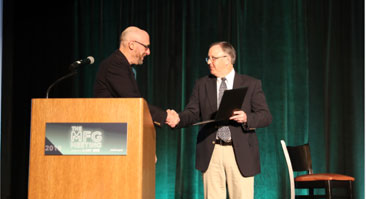| Sherrill Manufacturing wins the 2019 National Metalworking Reshoring Award

Greg Owens accepted the Award from Harry Moser on March 8, 2019, at the MFG Meeting in Tucson.
Sherrill Manufacturing became the only flatware manufacturer in the U.S. when it purchased and restarted portions of the Oneida Ltd. flatware factory in Sherrill, NY. Product innovation and quality drive Sherrill’s success as it sells its brand, Liberty Tabletop, primarily direct to consumers over the internet. The winner also received a letter of congratulation from Ian Steff, Deputy Assistant Secretary for Manufacturing, U.S. Department of Commerce. AMT, NTMA, PMA and the Reshoring Initiative sponsored the award. The 2020 Award will be launched soon. Contact us for application details.

A selection of Liberty Tabletop’s Made in USA flatware
Supply Chain Perils: Reports show increased risk to global supply chains in 2018 will continue into 2019. This volatility behooves managers to find more localized manufacturing sites to mitigate any disruptions.
U.S./Mexico partnership? Mexico and the U.S. should team up to reshore and nearshore work flowing out of China in response to rising wages and U.S. tariffs, especially because Mexico’s exports to the U.S. include 40 percent U.S. content. The impact of Mexico’s cartels on the safety of operations and employees requires attention.
The psychological impact of job loss: Multiple studies document The Despair of America’s Nonworking Men and the severe psychological impact of job loss. In manufacturing, most of these losses stem from offshoring. In our next newsletter, the Reshoring Initiative will report on our research into providing good jobs via reshoring and FDI as a feasible remedy.
Does the U.S. face a security threat from China? The answer is yes. This piece in the Washington Times sounds the alarm and urges the U.S. toward a more aggressive policy to counter China’s race for dominance in super computing, space exploration and artificial intelligence, areas that pose the greatest risk to national security.
Trade negotiations are difficult to predict, but some things remain certain: HBS professor Willy Shih outlines those economic forces – tradability, labor arbitrage, subbing capital for labor or vice versa, and government policies – largely consistent with our model of trade and reshoring. He notes that, “Rising costs in emerging markets and increased use of automation are likely to decrease trade based on labor arbitrage as a percentage of overall trade volumes in the years ahead.”
Consider The Silver Lining in the U.S. Manufacturing Slowdown: The predicted slowdown may offer many companies and industries vital time to accommodate upcoming trends such as additive manufacturing. “In an additive-based economy, Americans will produce most of their goods domestically.”
NC State, Wilson College of Textiles: “Investigation of Textile and Apparel Reshoring Based on Contingency Factors and Reshoring Drivers” provides useful insights into what has driven the reshoring of apparel and textiles. |